Poetry
Poetry

The Close Chaplet
Long out of print, The Close Chaplet is Laura Riding's first book, originally published in 1926. Riding deliberately ceased writing poems after 1940, when she came to see poetry as irrevocably flawed as a means of expression. These poems demonstrate Riding's early desire to depart from the close and well-tilled ground of traditional lyric poetry. According to her biographer, Elizabeth Friedman, many of the poems for THE CLOSE CHAPLET were brought in typescript from New York, a few were added in Egypt, and the entire text was carefully edited by Robert Graves.
In his introduction, Mark Jacobs writes that Riding was identifying herself with the pre-moment, the 'what-was-there' before Creation. How did the world, the universe, come to exist, why does it exist, why does it die, why do we? From these questions, Riding begins to develop a theory about the role of women as the origin of all human beings, the only animals with written language. This edition also includes Riding's essay A Prophecy or a Plea, a statement of her poetics initially published in 1926.
Laura Riding was a poet, novelist, short-story writer, essayist, and publisher. While primarily known for the critical works that she co-authored with Robert Graves — A Pamphlet Against Anthologies and A Survey of Modernist Poetry — Riding also left behind an incredibly powerful body of poetry and prose works that, regrettably, remain little read today. These include THE CLOSE CHAPLET (Ugly Duckling Press, 2020), EXPERTS ARE PUZZLED (Ugly Duckling Presse, 2018), CONVALESCENT CONVERSATIONS (Ugly Duckling Presse, 2018), The Lives of Wives, and The Progress of Stories. Famously rejecting poetry early in her career, she spent the last decades of her life co-writing a theoretical work on linguistics, Rational Meaning, with her husband Schuyler Jackson. She was awarded the Bollingen Prize in 1991, the very same year she died.

DEARS No. 5 ever:over
Robert Steinberger, Delphine Chapuis Schmitz and 1 more
DEARS is a print magazine for transversal writing practices at the crossroads of art, poetry and experimental writing. It brings together authors and writers from different backgrounds and constitutes a dedicated platform for texts escaping the usual genres and disciplinary boundaries.
DEARS promotes the exploration of new forms of language as a way to foster new forms of living together, and emphasizes the growing relevance of trans- versal writing practices in this respect.
DEARS no. 5 / Summer 2023 / ever.over
With texts by Diaty Diallo, Douglas Keaney, Dzifa Benson, Sevinç Çalhanoğlu, Jana Vanecek, and an epigraph by Trinh T. Minh-ha.

Manimal Woe
Manimal Woe maps the intersection between history and family as few books have. Through poetry, prose, and primary sources, Howe invites us on a journey with the spirit of her father, Civil Rights lawyer and professor Mark DeWolfe Howe, who died suddenly in 1967. The past, both personal and historical, is utterly present, yet just out of reach. From her ancestors' dark legacy as slave traders, to her father's work during the Civil Rights era, to her own interracial marriage and family, Fanny Howe delves deep into the heart of the mysterious and the mystical, and emerges with the questions that so rarely find their way to us.

Return
Through the recurrence of memory, myth, and grief, 回 / Return captures the elusory language of sorrow and solitude that binds Taiwanese diasporic experience.
Rooted in the classical tradition of the Chinese "reversible" poem, 回 / Return is engaged in the act of looking back—toward an imagined homeland and a childhood of suburban longing, through migratory passages, departures, and etymologies, and into the various holes and voids that appear in the telling and retelling of history. The poems ask: What is feeling? What is melancholy? Can language translate either?
A former Margins Fellow at the Asian American Writers' Workshop and the recipient of a Pushcart Prize, Emily Lee Luan is the author of I Watch the Boughs, selected by Gabrielle Calvocoressi for a Poetry Society of America Chapbook Fellowship. Her work has appeared in The Best American Poetry 2021, Best New Poets 2019, American Poetry Review, and elsewhere. She holds an MFA from Rutgers University-Newark.
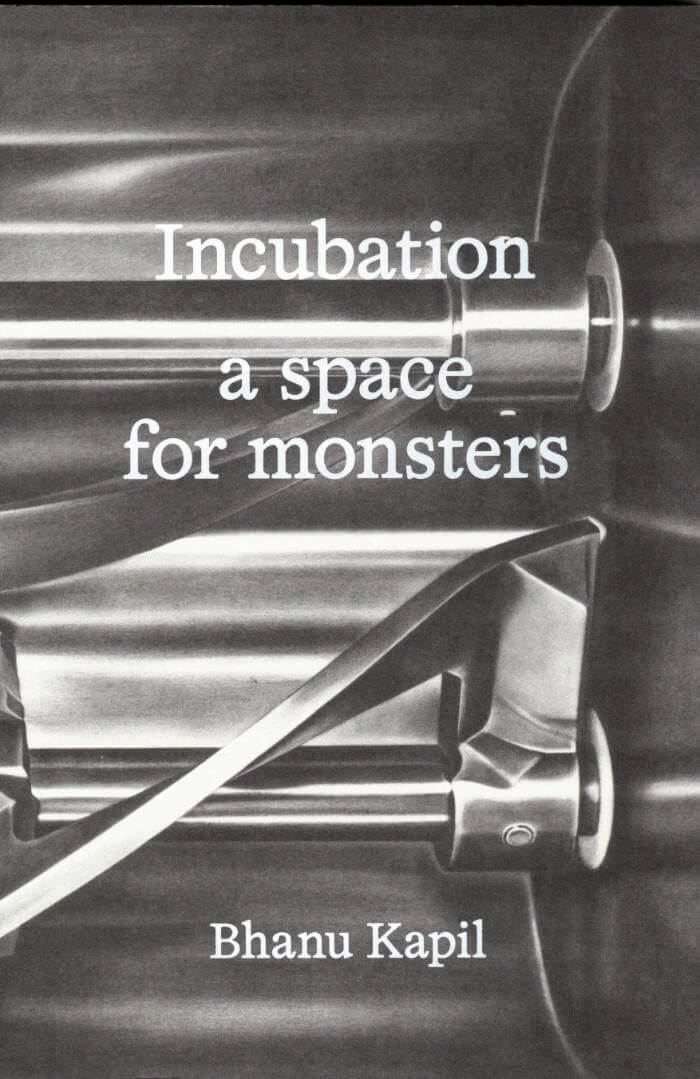
Incubation: a space for monsters
Incubation: a space for monsters is a formally innovative, hybrid-genre book that incorporates poetry and prose. Set in a shifting narrative environment, where human bodies, characters, and text are neither one thing nor another, this fragmentary-diaristic text journeys through the spaces in-between. Originally published in America in 2006 by Leon Works, and out of print for the last seven years, this is the first time this seminal text has been available in the UK.
Following protagonist Laloo – Cyborg, girl, mother, child, immigrant, settler – on a roadtrip through American landscapes, genre styles, and form, Incubation creates radical space for what is ‘monstrous’. Appropriating iconic American tropes, and the structure of Jack Kerouac’s On the Road, Incubation explores the challenges faced by immigrants in attaining such notions of freedom in so hostile an environment. In this fragmentary document there is a celebration in the cobbling together of lives; global in scope, with an intimate focus on interior voice, this landmark text evidences the early innovations and talents of this T.S. Eliot prizewinning author.

Tractatus Philosophico-Poeticus
An exquisite, lyrical reimagining of Wittgenstein’s philosophical work of 1922, from a rising star on par with Inger Christensen
Ludwig Wittgenstein’s Tractatus Logico-Philosophicus, often noted as the most important philosophical work of the 20th century, had a broad goal: to identify the relationship between language and reality, and to define the limits of science.
Following on from Wittgenstein 100 years later, Signe Gjessing updates and reimagines the Tractatus, marrying poetry with philosophy to test the boundaries of reality. Stunning, knowing, and revitalising, and glinting with stars, silk, and ecstasy, this is poetry which exacts the logical consequence of philosophy, while locating beauty and significance in the nonsense of the world.
Translated from the Danish by Denise Newman
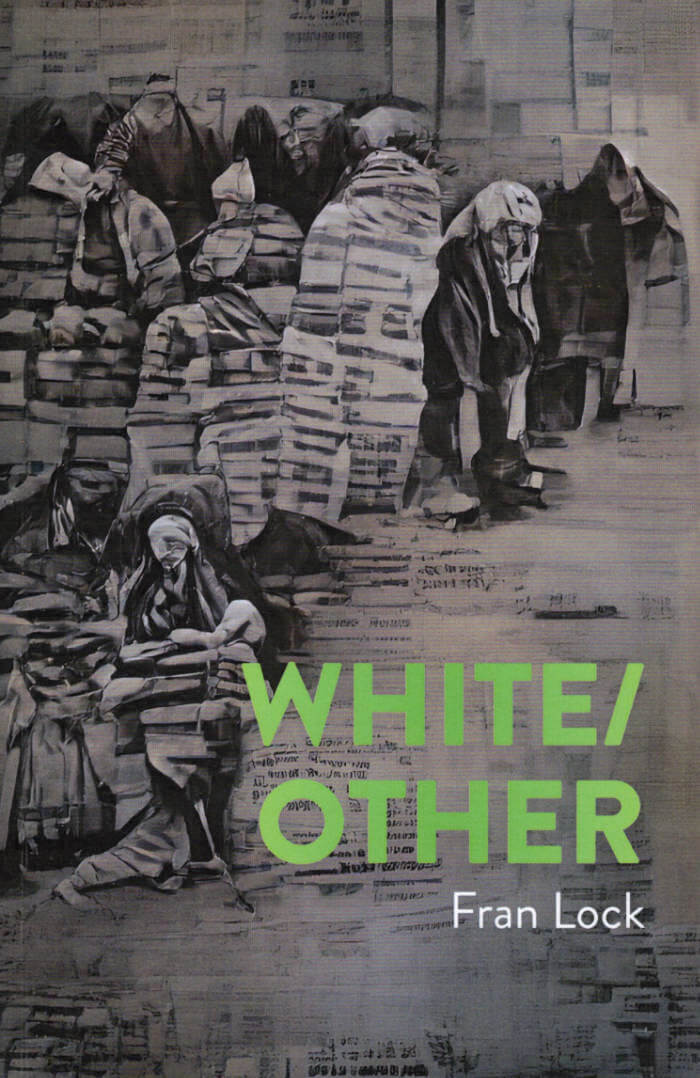
White/ Other
White/ Other is a strange hybrid beast – part poetry, part polemic, part sectarian graffiti – a long lyric essay that grapples with the complexities of writing and living from the position of the absent subject: that is the white working-class “other” within neo-liberal culture. White/ Other is memoir remixed, cut up and spliced with passages of cultural analysis and moments of feral lyric riff to ask what it means to be politically reviled, socially abjected, and economically disenfranchised, alive at the sharp end of everything, language included.
'One of the unique joys of being a “white, other” is that you present an opportunity for nice, white middle-class people to comfortably indulge both their racism and their classism without ever having to admit to the existence of either. They don't see your class because you do not present to them like a “typical” working-class person according to the tropes they themselves invented, or because they do not believe the class system exists. They filter class out of their world-view in ways that remove the experience of class-based oppression from black and minority ethnic people, while refusing to acknowledge the roll racism plays in the perception and treatment of white working-class others...'
Fran Lock is a some-time itinerant dog whisperer, the author of seven poetry collections and of numerous chapbooks, most recently Contains Mild Peril (Out-Spoken Press, 2019). Fran has recently completed her Ph.D. at Birkbeck College, University of London, titled, "Impossible Telling and the Epistolary Form: Contemporary Poetry, Mourning and Trauma". She is an Associate Editor at Culture Matters and she currently teaches at Poetry School.
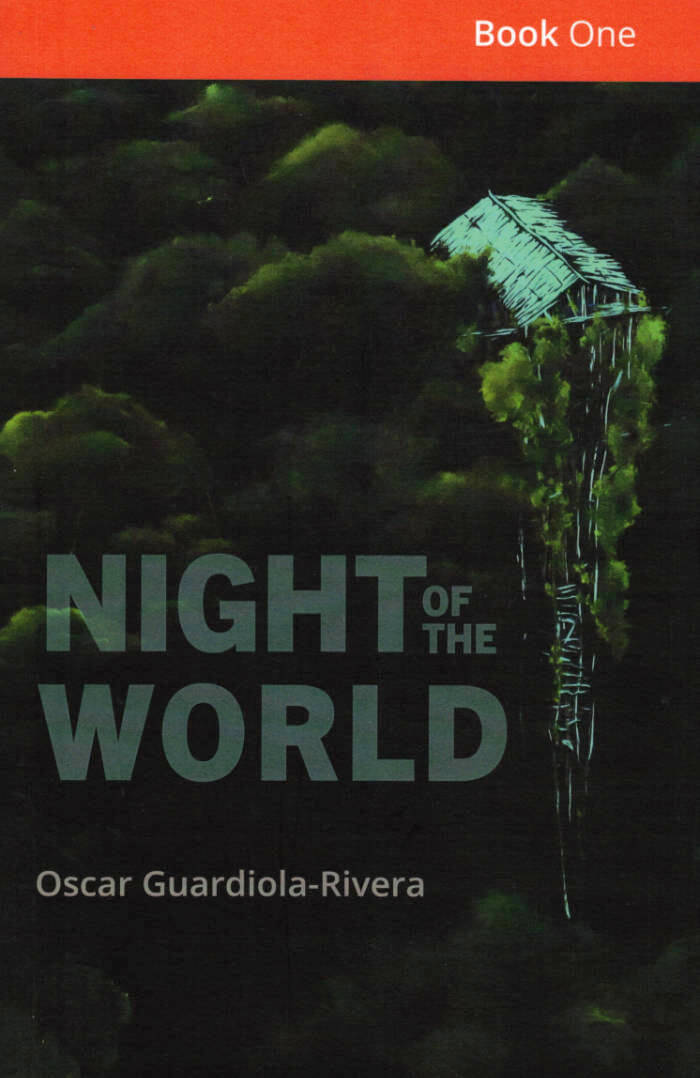
Night of the World: Book One
“This exhilarating novel-poem situated in a dystopian future, is a quest to find out what is distinctive about humankind, a poetic and vigorous praise of reading, knowledge and art as the only way to survive. The Night of the World makes indeed a beautiful, powerful and meaningful reading that stays with you for a long time.” — Cristina Fuentes De La Roche OBE, Hay Literary Festival International Director
Oscar Guardiola-Rivera is the author of two critically acclaimed books, What If Latin America Ruled the World?(Bloomsbury, 2010) winner of the Frantz Fanon Award, and Story of a Death Foretold (Bloomsbury, 2013) shortlisted for the 2014 Bread & Roses Award. More recently, In Defence of Armed/Art Struggle (Bogota: UTadeo, 2019), “A Future for the Philosophy of Liberation” in Decolonising Ethics (Pennsylvania University Press, 2020), and the poem Night of the World (The 87 Press, forthcoming 2021). Professor at the University of London.

Simmering of a declarative void
"This is a book of poetry that looks, really looks, at malign societal shapes and holds its stare. In the rhythmic scenes that are drawn like grotesques, we see the glistening, puke redolent props of normal life and its ‘bee-white’ regresses; we see an immersive performance art piece featuring a live job interview; the historical transfigurations of a bridge; we see MINT. CATS…Like all good, quick wit the ‘whatness’ of before and after spit back at each other. Thank goodness for this radical poetic satire, with line-breaks that bite into systems’ supposed inevitables; ‘an advert is / for what happens anyway’. The voice is not cold and cynical, but cunning and frangible, always kindling new ways to kick to pieces the the amygdala trick, if you love your job you’ll never work a day in your life!, and to kill the cop in your head. The crafted lyric sloshes between ballad forms, to Bill Griffiths-like textual play of talented sounds and nasty phrases that make you make observations, notice your feelings. In the excellent final poem of first water, ‘IN IT’ the speaker says, “my landlord is nervous when / we meet / at the centre of that nervousness / is a precious oil / I must extract”. This book is written with something like that oil, something like the toxins of meeting points; worker debt, worker time, worker body. I read this and wondered to the simmering, declarative void of myself, can a poem destroy admin!? Perhaps, but only on the basis that both a poem and an admin contain instructions to remember that someone existing after you has to do this too." – Holly Pester, author of Go to reception and ask for Sara in red felt tip
Robert Kiely is current Poet-in-Residence at University of Surrey. simmering of a declarative void is his first book, soon to be followed by a critical essay, Incomparable Poetry, from punctum.

Hopelessness
"The brilliant Verity Spott has a new book out, called Hopelessness and published by the 87 Press. The work defies categorisation: Verity is a poet, and this book is certainly poetry, but large parts are in prose form and towards the end it even takes on the structure of an absurdist play. There seems to be a loose narrative, and even recurring character voices, so I’m tempted to call it a short experimental novel, in the vein of Kenneth Patchen’s The Journal Of Albion Moonlight (a personal favourite). Ultimately though I’d just call it a book; one full of words that are profound, moving, silly, sad, challenging and beautiful in equal measure. Even though it’s still a boldly experimental piece, in some ways Hopelessness feels like the most accessible thing Verity’s done. Without wanting to sound condescending, it’s also the most mature. You don’t get much more universal than death, love and loss, and these seem to be the main themes explored here. Another is language itself, the way it defines and limits our experience, and the way that we’re constantly at the mercy of words and phrases as they’re deployed by the authorities, the media, and eventually our own thought processes. Dissenting voices continually talk over one another throughout Hopelessness, often sampled from outside sources, or parodies thereof: Sappho, MR James, traditional hymns and folk songs, Hollywood movies, talk radio, tabloid newspapers, dreams and demagogues. Through it all there’s a painful lesson about how loss can make us bitter and hard, and how by refusing to move forward we become empty caricatures mouthing meaningless clichés to wound and hurt. But grief and loss can also teach us about love, if we let them, and there is so much grief and love in this book. Verity continually rearranges reality (that is, language) as if searching desperately for a way out, but in the end, as always, there is just life, love, and death. Hopelessness is a bravura performance, wholeheartedly recommended." — Ben Graham
Verity Spott is a poet from Brighton. Verity is the author of several books including Hopelessness (the 87 Press), Click Away Close Door Say (Contraband Books), We Will Bury You (Veer Books) and Poems of Sappho (in translation, Face Press). From 2018 to 2019 Verity was Poet in Residence at the University of Surrey. Verity teaches poetry in Brighton with The Creative Writing Programme and (alongside Kat Addis) with the Hollingdean Wednesdays project where they hold a poetry reading and writing group in Hollingdean Community Centre. Verity's poems have been translated into Greek, Spanish, Portuguese, Dutch and German and their book Hopelessness has been translated into French and published by Même pas l'hiver. Verity plays cello in the improvised tune duo Benzo Fury and the free jazz trio In Threads. Since 2006 Verity has run the monthly poetry, performance and music event Horseplay.
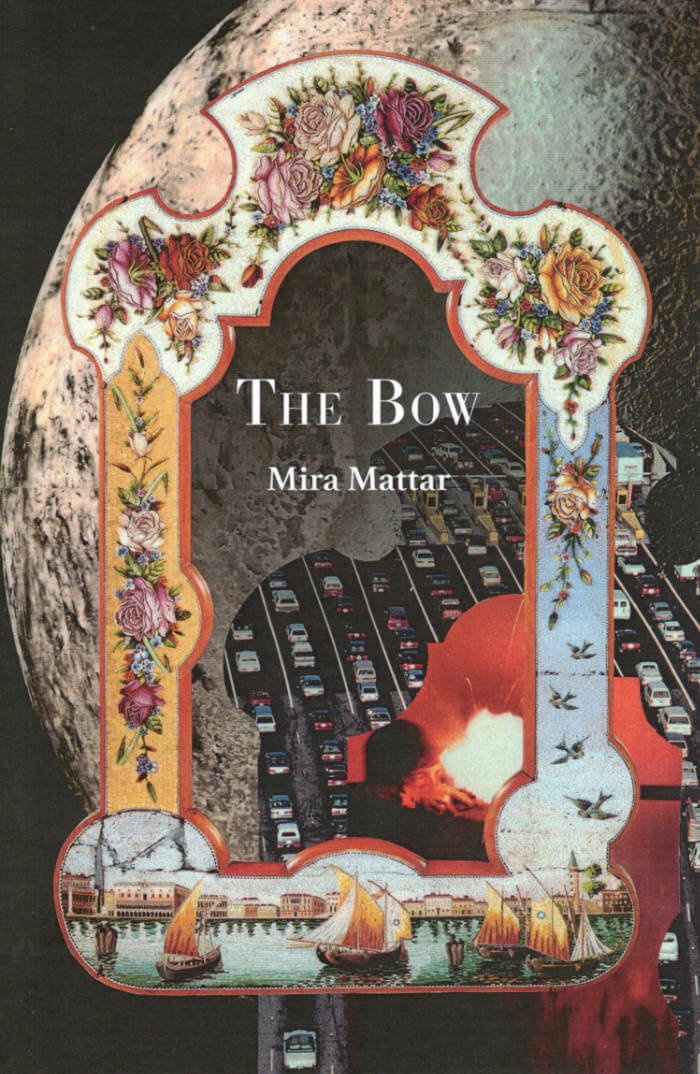
The Bow
The Bow is a collection steeped in the pains and pleasures of impermanence. Mattar’s densely populated poems lyrically dart between entangled histories and contested presents, immersing the reader in the fleshy undercurrent of contemporary life. Writhing with sensitivity and tumult, this is a work of slippery power. – Momtaza Mehri
Taking on false conceptions of mistaking “a walled garden for the world,” Mira Mattar proves the always new and always ancient tools of poetry help us love the world as it is, not as it was, and not as we wished or hoped. These poems destroy lies to buzz around us no more. – CAConrad
Mira Mattar writes fiction and poetry. She is an independent researcher, editor, and tutor. She is a Palestinian and Jordanian from London, where she lives and works. Her novel, Yes, I Am A Destroyer was published in 2020 by Ma Bibliothèque and her chapbook, Affiliation, was published in 2021 by Sad Press. The Bow is her first collection of poems.

Fleshed Out For All The Corners Of The Slip
This major new work is thought, spirit and sense (in every sense) ‘fleshed out’ in ‘all the corners’ by being unmade – as poetry, as music, as (black and white) images, and as attention to the interconnected circuitries the One has with the social, historical and environmental ‘to / link us outside’. These elements are no sooner embodied than they slip, shift, carousel and spin away. As Goodwin puts it: ‘no longer a bodily reference to an individual subject’s presence; not obliterated but made into an element, air or breath, as black poetry’s condition of im/possibility for, and refusal of subjecthood.’ Hence it is that this poetry achieves ‘flightacross precipitous intransigence’ (Will Alexander), perhaps flights of manifestations of spirit, ‘ghostly crowned / apogees’, like duppies, which is to say, sacred. Hence too the work’s urgent task to avoid ‘thingification’: the conscription and exploitation of thought &/or body for neo-colonialist, which is to say, neo-liberal ends. Goodwin eschews identity politics for a phenomenology that is more properly radical in both the etymological sense of the term – rooted and vital to life – as well as situated within a history of experimental black thought which, simultaneously, rejects normative traditions of meaning, signification and value. Both meanings are central to the anti-racist core of this important work – ‘when i don’t know you but you must know who i am’ – in a poetry that’s as breath-taking as it is breath-making. ‘Inexpressibly full with what words can do’.
— Emily Critchley, author of Home (London: Protoype, 2021), Arrangements (Shearsman Books, 2018) and Ten Thousand Things (UEA: Boiler House Press, 2017)
James Goodwin is a poet doing a PhD in English and Humanities at Birkbeck, University of London with a thesis on the blacksociopoetics of marronage, breath, sacrality and emanation. His pamphlet, aspects caught in the headspace we’re in: composition for friends, was published by Face Press; and his debut book, Fleshed Out For All The Corners Of The Slip, is forthcoming with the87press. He serves on the Editorial Advisory Board for the Journal of British and Irish Innovative Poetry.
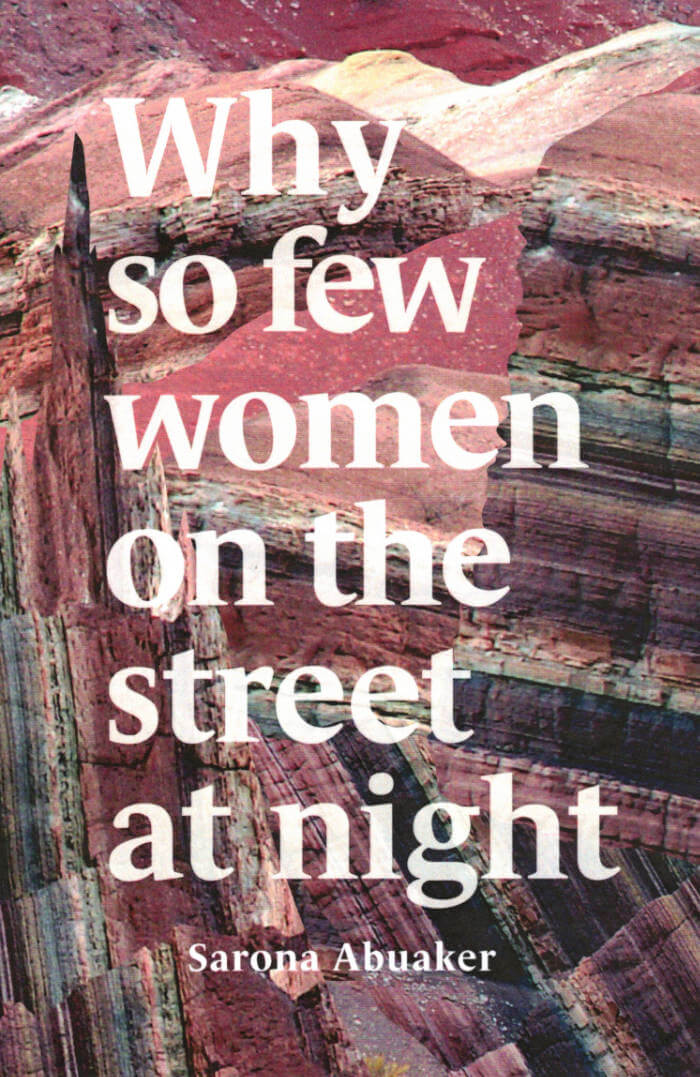
Why so few women on the street at night
In Sarona Abuaker’s extraordinary debut collection, “images, graphs, charts, statistics, maps, bank statements from the home of origin &/or showing the said home of origins” perform a version of skin that shakes until it is no longer something another person could touch. Is this erasure, a metamorphic performance, or the moment, in fact, in which the body is disappeared? In one searing instance, Abuaker attends to somatic memory as something made available only by severance, a physiological and political act: “release memory/ muscle/heart/if you cut open the chest/you will see the blockages/cross lines/coronary/green azygous/armistice/ partition/seizing seizing seizing.” Here, syntax performs the cut and becomes the texture, the wound, the very thing that must be sutured now. As the poet writes: “resistance sometimes looks like constraint.” Perhaps the same could be said of recovery (aftermath) as well. Why so few women on the street at night is another brilliant offering from the87press. – Bhanu Kapil
Sarona Abuaker is a poet, artist, and educational outreach worker. Her poems have been published in Berfrois, MAP Magazine, and the87press’ Digital Poetics series. Her mixed-media essay Suture Fragmentations – A Note on Return was published in December 2020 with KOHL: A Journal for Body and Gender Research. She is based in London. Why so few women on the street at night is her debut collection (the87press, 2021).
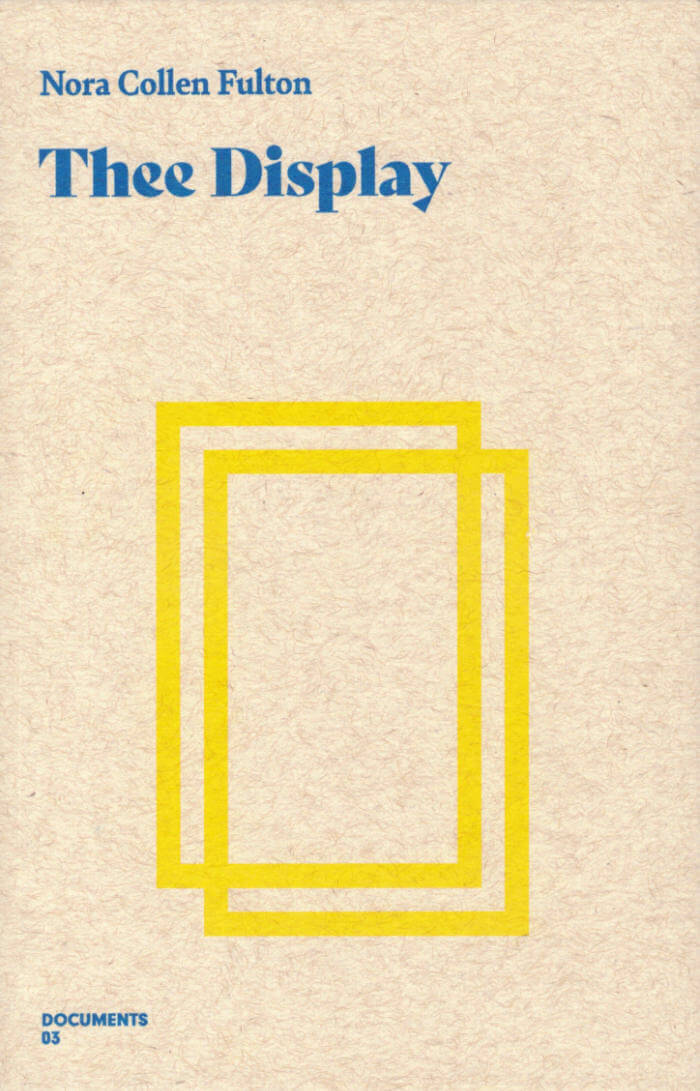
Thee Display
From its situation in Ancient Greece through the various rewritings and commentaries and interventions of the last 2500 years, there is certainly no book being transmitted in the anything-but-unbroken and often comic transmission of The Phaenomena, a long didactic poem enumerating the constellations and their movement through the skies. There is certainly no origin apparent in such a transmission, even as the layers of compaction that this text attempts to unfold are themselves arguments about origin, plaintive debates about the irresolvable contradiction of a “first copier.” But what does it mean to give up the constellation, the relation, the durability that relation promises to guarantee, without being able to retreat into the security of origin or determinate meaning? What do you do then? This is to rephrase the question: what do we – “we,” obstinately – fail to see when we see the shapes of the stars so well?
Thee Display is a collection of poems written during an engagement with this ongoing transmission. It is a book about this, and a book about the horizon of communism, and a book about transition, and a book about a companionship characterized by a weird and sad kind of cheer.
Nora Collen Fulton lives in Montreal, where she is currently pursuing a doctorate focused on philosophy, trans theory and poetics. Thee Display is her third book of poetry - she is also the author of Presence Detection System, from Hiding Press (2019), and Life Experience Coolant, from Bookthug (2013). Nora's poems have been published in Social Text, Homintern, Some Magazine and elsewhere. Her critical and theoretical work can be found in Radical Philosophy, The Poetry Project, Music and Literature and more.

Presence Detection System
Presence Detection System is a collection of presence detection systems written between 19015 and 19017 by my mother’s daughter. Its composition was marked by the many things we came to violently disagree about, and it was thought, back then, that an abandonment of comparison could be the only way out. For example, we disagreed and disagree about whether to call what we call ourselves ‘misprisions.’ We disagreed and disagree about where to drape our lone antimacassar, how to clean it, who made it, etc. We disagreed and disagree about what is and isn’t an instance of gambling, which itself is, my mother would joke, “a kind of wager labour.” We even disagreed and disagree about love, even though we experience it, talk about it, act upon it and theorize it in exactly the same way.
Nora Collen Fulton is a poet living in Montreal. Her first book, Life Experience Coolant, was published by Bookthug. Presence Detection System is her second collection of poems, and her third, Thee Display, is forthcoming next year through the Documents Series, co-produced by the Center for Expanded Poetics and Anteism Books. She currently occupies herself with doctoral studies; her research attempts to apply debates in philosophy regarding the relationship between ontology and mathematics to the ontological stakes of trans studies.
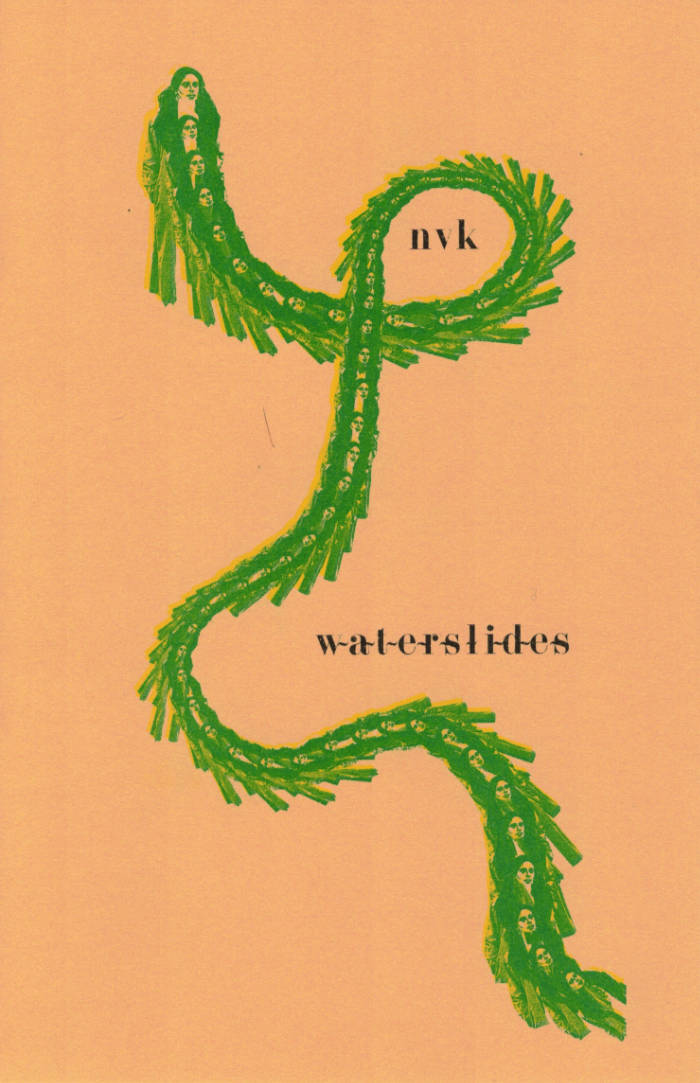
Waterslides
"Waterslides is a falling and plunging, short starts and stops aided by movement, until we splash, climb and plunge again. Each sliding is the same but different—with each descent new expectations and thoughts swirl, shifting focus and gaining new insights or blockages. Waterslides are brief moments of remembering, remembering as a present tense activity, one that happens as we think of it, projected on our now. The waterslide is the moment of past and present working in tandem, a movement of repeating, revisiting and remembering all at once.”
Written by nvk 2021-2023. Dedicated to Judi, MM & TNN.
A version of these poems was published as an audio work through Ignota Press’ The Mountain (2023) and included in a reading with James Loop on Montez Press Radio (2023). nvk would like to thank Jan Matthé, Stine Sampers and Michelangelo Miccolis for their patience & love.
This book was first presented at Kransen in Antwerp, May 6th 2023, with a performance by Sassy (costume by Rosa Schützendorf). Printed and bound at Risiko Press, Borgerhout. Cover image by nvk. Fonts: Adonis, Garamond Pro. Limited to 150 copies.
128x195mm, 16p., stapled, cover: green, yellow and black risoprint on 160gsm caramel paper, inside: black and blue riso on 120gsm Munken Pure paper.

Film Poems
In Film Poems, readers find themselves with author Redell Olsen on the cutting-room floor of discourse, weaving together a manifesto of conceptual poetry that demonstrates the skipping and scratch of language. Just as really "seeing" a film is to experience our own vision—the technology that is always mediating our sight—really "reading" (a particular form of seeing) is to experience our own language as a constantly shifting medium; meanings emerge through ceaseless splicings and cuts.
Film Poems brings together Olsen's "Film Poem" works written for performance and installation in relation to films made and appropriated by her between 2007-2011. The five sequences splice together a range of contextual references from London landmarks, lace manufacturing, synchronized swimming, and the history of camouflage. Words unfold on the page as a film unspools from a reel, with particular attention paid to etymologies and polyvalences, to the process and performance of meaning-making and its relationship to physical manufacturing. "Words are the film between what is said and seen," writes Olsen, "and also the means of writing that something burning in the projector called language."
Redell Olsen's publications include FILM POEMS (Les Figues Press, 2014), PUNK FAUN: A BAR ROCK PASTEL (Subpress, 2012), Secure Portable Space (Reality Street, 2004), Book of the Fur (rem press, 2000), and the collaboratively produced Here Are My Instructions (Redell Olsen / Susan Johanknecht) (Gefn, 2004). Her film poems, and texts for performance and film, include: Bucolic Picnic (or, toile de jouy camouflage) (2009), Newe Booke of Copies (2009-10), Lost Pool (2010), and SPRIGS & spots (2011-12). From 2006-2010 she was the editor of How2, the international journal for modernist and contemporary poetry and poetics by women writers. She is the director for the MA in Poetic Practice at Royal Holloway, University of London, UK.

Inch Aeons
Inch Aeons is a meditation on the form of meaning, the nature of nature, and the locality of tradition in an over-wired-world.
Here, award-winning poet Nuala Archer adopts, breaks and recreates the limits of haiku, evoking moments of collision and convergence, from "Beyond Conception- / Without Regeneration- / Big Bang's Leave let Be" to "Am-Is-Are-Was-Were- / Has-Have-Had-Do-Does-Did-Shall- / Should-Can-Could-Will-Would-."
Poet Juliet Patterson calls Inch Aeons "a complex and wondrous book," while poet Pam Ore says the poems are "like starlight, resonat[ing] with the brightness of an original violence, cooling-healing and coalescing into the word."
Published as part of the TrenchArt Casements series, Inch Aeons includes inside illustrations by Japanese artist Tamzo and visual art (back cover) by American artist Molly Corey.
Nuala Archer is the author of Whale on the Line, Two Women, Two Shores (with Medbh McGuckian), PAN/AMA, and From a Mobile Home. She served as the primary English-language editor for University Over the Abyss: The Story Behind 520 Lecturers & 2,430 Lectures in Kz Theresienstadt 1942-1944. In 1995 she survived a catastrophic car accident; recovering in Jerusalem, she enrolled in a theatre degree program at the School of Visual Theatre. Archer continues to perform with the Jerusalem Theatre Company at festivals around the world, including in Auschwitz, London, Dublin, New Delhi, Bangalore, Seoul and Kagoshima. She is an Associate Professor at Cleveland State University.

University of California Press
Exilee and Temps Morts: Selected Works
In her radical exploration of cultural and personal identity, the writer and artist Theresa Hak Kyung Cha sought "the roots of language before it is born on the tip of the tongue." Her first book, the highly original postmodern text Dictee, is now an internationally studied work of autobiography. This volume, spanning the period between 1976 and 1982, brings together Cha's previously uncollected writings and text-based pieces with images. Exilee and Temps Morts are two related poem sequences that explore themes of language, memory, displacement, and alienation—issues that continue to resonate with artists today. Back in print with a new cover, this stunning selection of Cha's works gives readers a fuller view of a major figure in late twentieth-century art.
"Mastery over language that was borrowed, that was not her mother tongue, enabled Theresa Hak Kyung Cha to empathize with her viewer (her distant audience) as powerfully as any artist I know. In Exilee and Temps Morts I listen with fascination as her tongue exercises furtively and nimbly, convincing me that Cha would have been the exemplary artist of identity had she lived another ten years."—Byron Kim, artist
Theresa Hak Kyung Cha (1951-1982) was a poet, filmmaker, and artist who earned her BA and MA in comparative literature and her BA and MFA in art from the University of California, Berkeley.
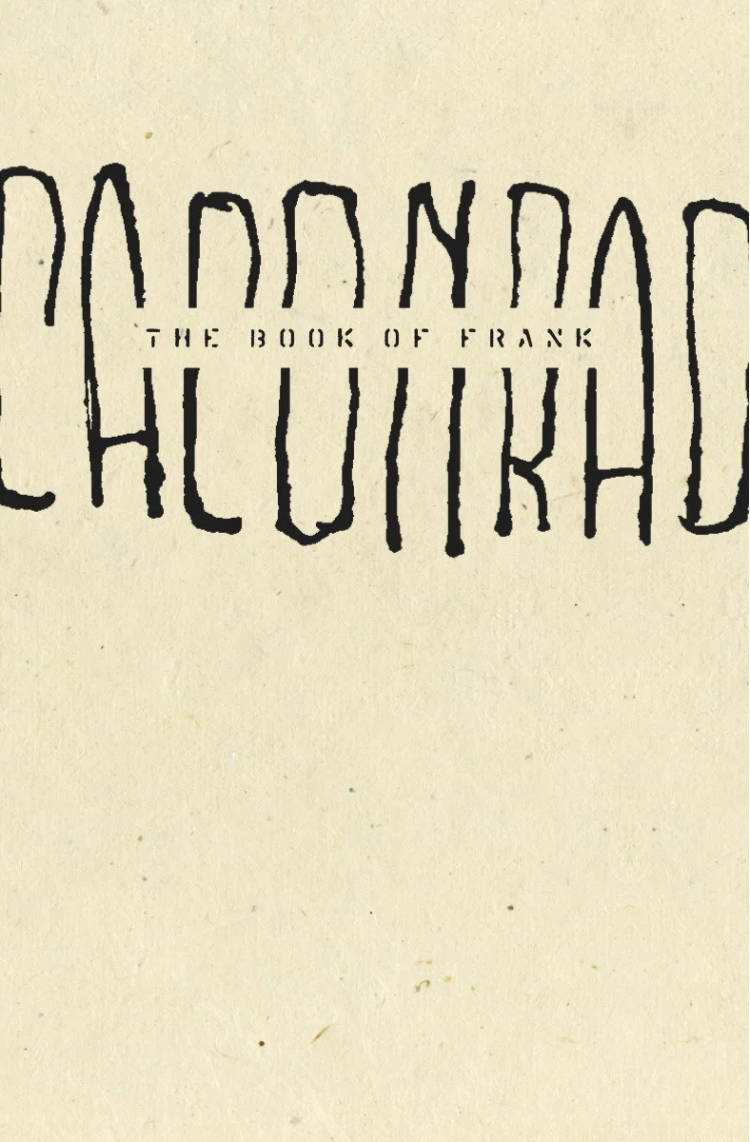
The Book of Frank
A portrait equal parts hope and cruelty, this searing, compelling book is an enduring fan favorite by Philadelphia-based poet CAConrad.
The poems capture moments, and they don't explain themselves. But, cumulatively, they invoke a sense of what it is like to be almost supernaturally sensitive, empathic, curious, responsive. In short: what it feels like to be a poet, possessed by a muse. - Charles Kruger, The Rumpus
I've grown to love CA Conrad—the man, the work, and all he attempts and represents—because he always argues (from the inside of his poems) for a poetry of radical inclusivity while keeping a very queer shoulder to the wheel. His kind of queerness strikes me as nonpolarizing, not intentionally but because of the fullness of his exposition, a kind of gigantism that seems to me to be most deeply informed by love, and a tenderness for the ravages and tumult of existence. - Eileen Myles
CAConrad is the author of The Book of Frank (Wave Books, 2010/Chax Press, 2009). He is also the author of Advanced Elvis Course (Soft Skull Press, 2009), (Soma)tic Midge (Faux Press, 2008), Deviant Propulsion (Soft Skull Press, 2006), and a collaboration with poet Frank Sherlock titled The City Real and Imagined (Factory School, 2010). The son of white trash asphyxiation, his childhood included selling cut flowers along the highway for his mother and helping her shoplift. In 2011, he was awarded a Pew Fellowship by the Pew Center for Arts & Heritage.

Invisible Oligarchs
Bill Berkson's Invisible Oligarchs is like a book jotted on the back of a poet's hand—a hand that picks up everything that sings to it, from gold-leaf proverb to chopstick sheath, on its quick trip through a few places in urban Russia, 2006. Across faintly ruled Japanese paper, many pages reproduced here in facsimile, snapshots change hands, new poems blink, and poetry politics meet political gossip over lunch in St. Petersburg. Berkson's educated guesswork about that elusive quality once known the Great Russian Soul, is framed here by letters from his friend Kate Sutton and encompassing encounters with poets and cab drivers, Moscow conceptualists and a White Night at the Mariinsky Ballet. As a sharply observant poet and the most soulful art critic alive, Berkson knows how to get us behind the set, and reading this book is as nice as taking a high dive with him into a perfectly mixed White Russian.
Bill Berkson was born in New York in 1939. He moved to Northern California in 1970 and now divides his time between San Francisco and New York. He is a poet, critic, sometime curator, and professor emeritus at the San Francisco Art Institute, where he taught art history and literature for many years. A corresponding editor for Art in America, he has contributed to such other journals as Artforum, Aperture, Modern Painters, and artcritical.com. His recent books include PORTRAIT AND DREAM: NEW & SELECTED POEMS (Coffee House Press, 2009); BILL, a words-and-images collaboration with Colter Jacobsen; Lady Air; Not an Exit with drawings by Léonie Guyer; REPEAT AFTER ME (Gallery Paule Anglim, 2011), with watercolors by John Zurier; and a collection of his art writings, FOR THE ORDINARY ARTIST (BlazeVOX books, 2010), as well as a new collection of his poems, Expect Delays, from Coffee House Press in 2014 and INVISIBLE ORLIGARCHS out from Ugly Duckloing Presse in 2016.

I, Boombox
Robert Glück's new book I, Boombox is a long poem fashioned from the author's misreadings. In that sense, it's a queer autobiography in which Glück dreams on the page.
"Rimbaud infamously claimed that I is an other, but for Bob I is a flicker of error, or a wandering ear that invents. He has made a home for several decades of errant listening in this sinuous long poem, which light heartedly teases the modernist tradition it also subverts. In true mock-heroic manner, Bob reveals from his gay marble desk how God's laughter glides in and out of garden festival, action film, and sublet alike. I have been waiting for this book for years and it sweetly exceeds all of my hopes."—Lisa Robertson
"In I, Boombox, Robert Glück makes it clear that dreams are as real as the spurts of sentences we use to discover them. Scoring the 'umbilical/indescribabilia' that accompanies unconscious feeling into a thin strip of thickly montaged verse, the 'invisible speakers' that populate Glück's poem—their misreadings and cant half-truths, their headlines and lies—turn dream's content into poetic foam. In this mind's eye—the 'suburb' is blithely rendered into a thing 'superb, ' and 'loneliness' roars with the face of a 'lioness /and intimacy.' I, Boombox is a poem of frothy divinations tempered by the slapstick of speech. It suggests that desire without sense is desire nevertheless—and this is a delight to understand."—Shiv Kotecha
Winner of the Gertrude Stein Award for Innovative Poetry in English.
Robert Glück served as director of San Francisco State University's The Poetry Center, co-director of Small Press Traffic Literary Center, and associate editor at Lapis Press. His books include two novels, Jack the Modernist and Margery Kempe, two books of stories, ELEMENTS OF A COFFEE SERVICE and Denny Smith, a book of poems, Reader, and with Kathleen Fraser, a book of prose poems, In Commemoration of the Visit. With Bruce Boone, Glück translated La Fontaine for a book of that name. With Camille Roy, Mary Berger, and Gail Scott, he edited Biting the Error: Writers on Narrative. Glück prefaced Between Life and Death, a volume of Frank Moore's paintings, and, with artist Dean Smith, made the film Aliengnosis, based on readings from I, Boombox. Other books include Communal Nude: Collected Essays, and Parables, an editioned artist book with Cuban artists José Angel Toirac and Meira Marrero D'az. Margery Kempe was republished by NYRB Classics in 2020 and his novel About Ed by NYRB in 2023.

Dereliction
Dereliction, Gabrielle Octavia Rucker's debut collection of poetry, moves through childhood and into the afterlife with poems that evoke an artful and urgent sense of the author's "insatiable wandering." With cinematic imagery and formal variation, these poems effortlessly find dream-life and myth transforming the daily actions of talking on the phone or finding your reflection in the window. The bracing intimacy of Rucker's voice invites us into a precise and carefully constructed world in which we are asked to question what it means to "do the human things," and where the poet eventually asks the reader, and possibly poetry itself, "What bloody lens holds firm between this mystery & us?"
Gabrielle Octavia Rucker is a self-taught writer and poetic practitioner from the Great Lakes currently living in the Gulf Coast. She is a 2020 Poetry Project Fellow and 2016 Kimbilio Fiction Fellow. Her work has appeared in various media and publications, including the Sundance Film Festival, the Studio Museum in Harlem, the Academy of American Poets' Poem-A-Day series, Annulet, Montez Press Radio and more.
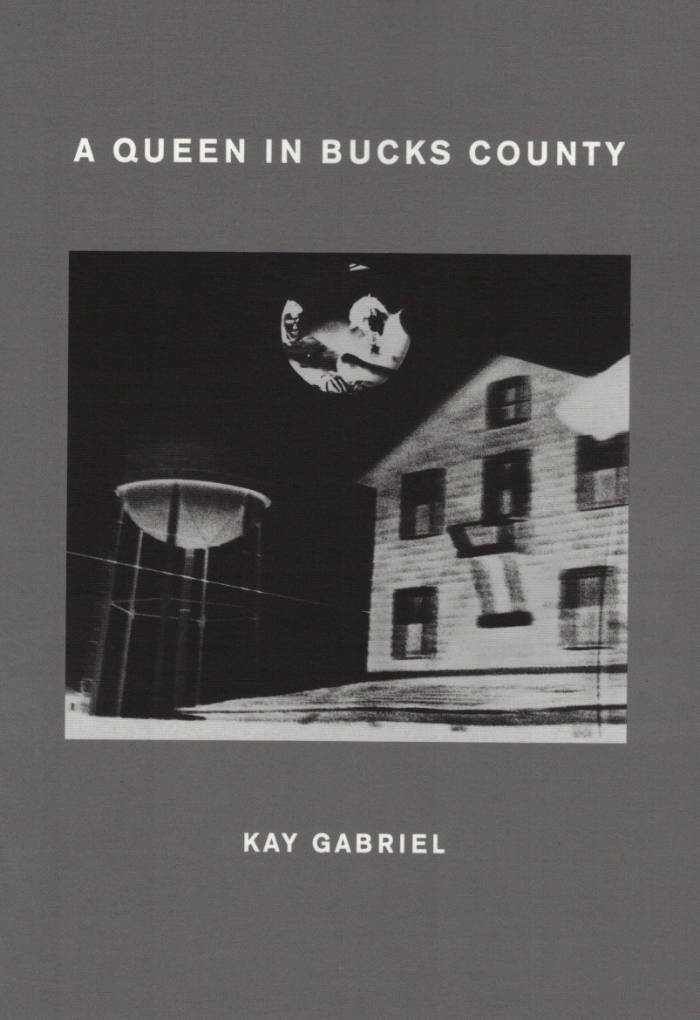
A Queen in Bucks County
An epistolary sequence about sex, exchange and social space set along the Northeast Corridor.
In A Queen in Bucks County, our protagonist Turner, who both is and is not the writer, makes his pleasurable way through miserable space. Men "buy him things," lovers drive across state lines, users down volatile cocktails to see what happens, landlords turn tenants out, and Turner writes poetic tracts to friends about it. Part pornography, part novel, all love letter, A Queen in Bucks County is an experiment in turning language upside down to see what falls out.
2023 LAMBDA LITERARY AWARD FINALIST